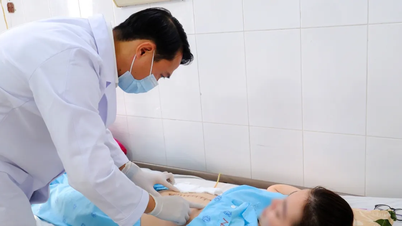(Dan Tri) - A 52-year-old male patient went to the doctor because of abdominal pain and bloody stools for about a month. The patient thought the bloody stools were due to constipation, but in fact, the doctor discovered a 5cm colon tumor.
On December 7, at the workshop Updating new advances in colorectal cancer surgery held at Bach Mai Hospital, doctors shared about a case of colon cancer detected from the sign of bloody stools.
"On the afternoon of December 6, we performed 3D laparoscopic surgery on the patient, resecting the left colon, removing the D3 lymph nodes, selectively ligulating the vessels, preserving the cholangiopancreatic vein, and creating an anastomosis between the colon and the body," said Dr. Nguyen Ngoc Hung, Director of the Center for Digestive Surgery, Bach Mai Hospital.
According to Dr. Hung, with conventional surgery, this patient would have to have half of the left colon removed, while in terms of oncology, only 10cm of the colon removed from the tumor would be enough.
3D laparoscopic surgery helps surgeons magnify and observe closely with 3D spatial images of important structures such as blood vessels and nerves, helping surgeons perform operations and techniques more meticulously and precisely, reducing complications during surgery.
Removing only the left colon helped the patient retain the maximum length of the colon, while still ensuring maximum lymph node dissection. It is expected that the patient can be discharged on the 4th or 5th day.

Associate Professor, Dr. Dao Xuan Co, Director of Bach Mai Hospital, and two leading international experts on colorectal cancer (Photo: MN).
Associate Professor, Dr. Dao Xuan Co, Director of the hospital, said that colorectal cancer is the fourth most common type in Vietnamese men after liver, lung and stomach cancer, and the third most common in women after breast and lung cancer.
According to the Director of Bach Mai Hospital, early diagnosis, multidisciplinary coordination, endoscopic surgery, and multimodal treatment contribute to saving lives and improving the quality of life for patients.
"Currently, endoscopic surgery and robotic surgery are minimally invasive surgical methods that help clearly observe anatomical structures, have the ability to operate precisely in narrow spaces, and contribute to preserving the patient's functions," said Associate Professor, Dr. Dao Xuan Co.
Complete laparoscopic surgery to treat colon cancer is a minimally invasive, safe intervention method with small incisions and low complication rates. With laparoscopic surgery, patients recover very quickly after surgery, and bowel circulation returns very soon, even immediately after surgery.
The patient also has very little pain so breathing is not restricted, less pain relief is needed, and the patient can exercise soon after surgery.
However, this is a difficult technique, requiring surgeons to be well-trained from basic to advanced, have good skills, extensive experience and adequate surgical equipment and supplies.
At the conference, Professor Eric Rullier - University of Bordeaux, Republic of France shared a new method in treating colorectal cancer, especially avoiding the need for permanent colostomy, contributing to a breakthrough in improving the quality of life for patients.
At the conference, 12 in-depth scientific reports were presented from the perspectives of diagnostic imaging, pre-surgery, laparoscopic surgery, robotic surgery, pathological anatomy, radiotherapy, post-radiation treatment and recovery care... providing comprehensive and useful information and knowledge in the diagnosis and optimal treatment of colorectal cancer.
Warning signs of colon cancer:
- Digestive disorders: Initially there may be heartburn, then abdominal pain, stomach cramps before or after eating.
- Constipation: If you go to the toilet less than 3 times a week, you should pay attention.
- Small, flat stools: There is a risk of the intestines encountering obstructions such as tumors or large polyps, causing the shape and size of the stool to change.
- Bloody stools: This is a fairly common symptom in patients with colorectal cancer.
- Unusual weight loss, fatigue: Most cancer cases show signs of rapid and significant weight loss in a short period of time without dieting or strenuous exercise.
If you have any of the above symptoms, do not delay going to the doctor. It may be just a sign of a common illness, but it can also be a sign of a dangerous cancer. The earlier it is detected, the higher the chance of cure.
Source: https://dantri.com.vn/suc-khoe/dau-hieu-khong-the-bo-qua-canh-bao-can-benh-ung-thu-gap-nhieu-o-hai-gioi-20241207215422274.htm



![[Photo] Binh Trieu 1 Bridge has been completed, raised by 1.1m, and will open to traffic at the end of November.](https://vphoto.vietnam.vn/thumb/1200x675/vietnam/resource/IMAGE/2025/10/2/a6549e2a3b5848a1ba76a1ded6141fae)




































































































Comment (0)